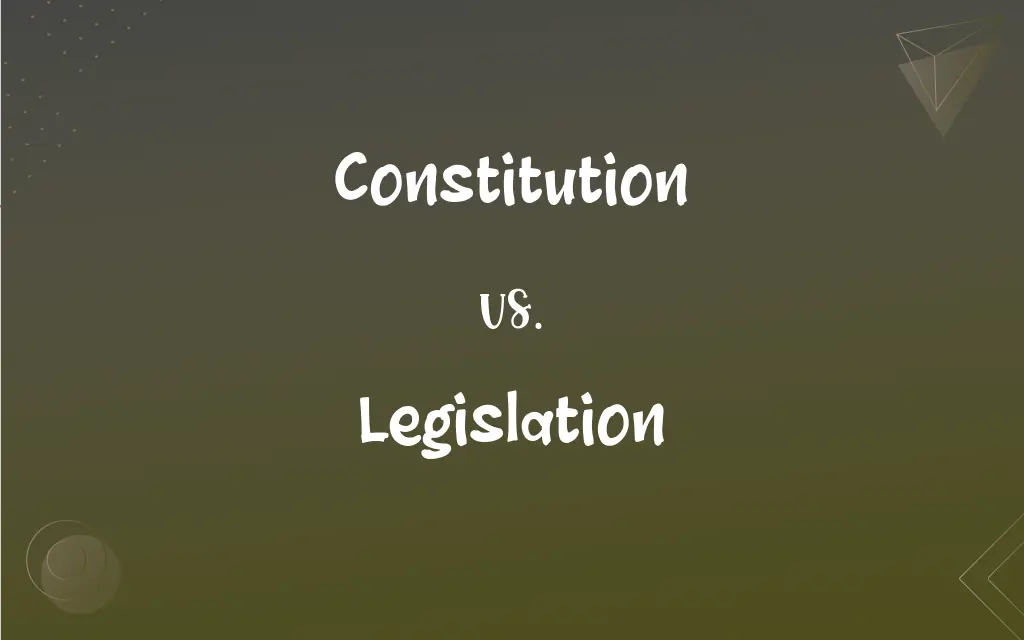Constitution vs. Legislation: What's the Difference?
By Janet White & Harlon Moss || Published on March 24, 2024
A constitution establishes the fundamental principles and framework of a political system, guiding the creation of laws, while legislation consists of laws passed by a governing body within the framework set by the constitution.

Key Differences
The constitution of a country is its supreme legal document, outlining the structure of the government, the distribution of powers among different branches, and the fundamental rights of citizens. It serves as the foundation for all other laws and governance practices, setting limits on what legislation can be enacted. On the other hand, legislation refers to the laws and statutes created by a country's legislative body, such as a parliament or congress, within the boundaries established by the constitution.
Constitutions are typically harder to amend or change than legislation, requiring special procedures that often include supermajorities in the legislative branch or direct approval by the electorate. This rigidity ensures that the foundational principles and structures of the government remain stable over time. Legislation, however, can be more easily modified or repealed by subsequent legislative actions, allowing for adaptability and responsiveness to changing societal needs and conditions.
The constitution provides the legal and philosophical basis for the rights and duties of citizens and the institutions of government. It often includes provisions on how legislation is to be made, outlining the roles of various branches of government and the processes for passing laws. Legislation, in contrast, deals with specific issues, policies, or situations, translating the broader principles found in the constitution into detailed, actionable rules and regulations.
While constitutions tend to be overarching and general in nature, allowing for a wide interpretation to accommodate various situations, legislation is specific and targeted, addressing particular problems or policy areas. For example, a constitution might guarantee the right to freedom of speech, while legislation might detail the specific circumstances under which that right can be limited, such as laws against hate speech.
The relationship between the constitution and legislation is one of hierarchy and interdependence. Legislation must conform to the constitutional framework, and any laws that conflict with the constitution can be challenged in court and declared unconstitutional. Thus, while the constitution sets the stage and outlines the boundaries, legislation fills in the details, providing the mechanisms through which the principles of the constitution are applied and enforced in everyday life.
ADVERTISEMENT
Comparison Chart
Definition
Supreme legal document establishing government structure and fundamental rights.
Laws passed by a governing body within the constitutional framework.
Changeability
Difficult to amend, requiring special procedures.
Easier to modify or repeal through legislative action.
Purpose
Sets the foundational principles and framework of the political system.
Addresses specific issues, policies, or situations.
Nature
General and overarching, providing a broad outline.
Specific and detailed, focusing on particular aspects.
Legal Hierarchy
Highest legal authority; all laws must conform to it.
Subordinate to the constitution; can be invalidated if unconstitutional.
ADVERTISEMENT
Constitution and Legislation Definitions
Constitution
Provides the framework for government operations.
The Constitution delineates federal and state powers, promoting a balance through federalism.
Legislation
Laws and statutes enacted by legislative bodies.
The Civil Rights Act of 1964 is a landmark piece of federal legislation prohibiting discrimination.
Constitution
Serves as the ultimate legal authority.
Judicial review allows courts to invalidate legislation conflicting with the Constitution.
Legislation
Addresses specific societal needs or issues.
Legislation on environmental protection regulates emissions and protects natural resources.
Constitution
The foundational legal document of a country.
The U.S. Constitution establishes the separation of powers among the legislative, executive, and judicial branches.
Legislation
Includes regulations and ordinances at various government levels.
Local zoning laws regulate land use in municipalities according to state and federal guidelines.
Constitution
Designed to be enduring with difficult amendment processes.
Amending the Constitution requires approval from two-thirds of both Houses of Congress and three-fourths of state legislatures.
Legislation
Can be changed or repealed by new legislative acts.
Prohibition in the U.S. was established by the 18th Amendment and later repealed by the 21st Amendment.
Constitution
Outlines fundamental rights and freedoms.
The Constitution guarantees freedom of speech, religion, and the press.
Legislation
Operates within the limits set by the constitution.
State laws must comply with both the U.S. Constitution and the respective state constitutions.
Constitution
The act or process of composing, setting up, or establishing.
Legislation
The act or process of legislating; lawmaking.
Constitution
The composition or structure of something; makeup.
Legislation
A proposed or enacted law or group of laws.
Constitution
The physical makeup of a person
Having a strong constitution, she had no trouble climbing the mountain.
Legislation
The act of legislating; preparation and enactment of laws.
Pass legislation
There is a lack of legislation about human cloning.
Legislation
Law which has been enacted by legislature or other governing body
Legislation
The act of legislating; preparation and enactment of laws; the laws enacted.
Pythagoras joined legislation to his philosophy.
Legislation
Law enacted by a legislative body
Legislation
The act of making or enacting laws
FAQs
Can legislation override the constitution?
No, legislation cannot override the constitution; it must operate within the constitutional framework, and laws conflicting with the constitution can be deemed unconstitutional.
Can the principles outlined in the constitution be changed?
Yes, the principles can be changed, but only through the formal amendment process, which is intentionally challenging to ensure stability and protect fundamental rights.
What happens if legislation conflicts with the constitution?
If legislation conflicts with the constitution, it can be challenged in court and may be struck down or modified to comply with constitutional requirements.
Who has the authority to pass legislation?
The authority to pass legislation is vested in the legislative body of a government, such as a parliament or congress, depending on the country's governance structure.
How does a new law become legislation?
A new law becomes legislation through a process that typically involves drafting, discussion, and approval by a legislative body, followed by ratification by the executive branch.
What role does the judiciary play in relation to the constitution and legislation?
The judiciary interprets both the constitution and legislation, ensuring laws comply with constitutional principles and resolving disputes over their meaning and application.
How do constitutions and legislation interact in a federal system?
In a federal system, constitutions and legislation interact at both national and state levels, with each level having its constitution and legislative body, operating under the overarching national constitution.
What is the purpose of having both a constitution and legislation?
The purpose is to provide a stable foundational legal framework (constitution) while allowing for adaptability and specificity in governance through laws (legislation) that address current societal needs and conditions.
What is the main difference between a constitution and legislation?
The constitution is the supreme legal framework of a country, while legislation refers to the specific laws passed within that framework.
How is a constitution amended?
Constitutions are amended through procedures outlined within them, often requiring significant consensus, such as supermajority votes in the legislature or referendums.
How often can a constitution be amended?
There is no set frequency for amending a constitution; amendments can occur whenever proposed changes meet the required approval criteria outlined in the constitution itself.
Can international law affect a country's constitution or legislation?
International law can influence a country's legislation and, in some cases, its constitution, especially if the country has agreed to abide by international treaties or conventions that require domestic legal adjustments.
Why is legislation important if we have a constitution?
Legislation is important for addressing specific, practical issues and situations, translating the broad principles of the constitution into detailed, applicable rules.
How do governments ensure legislation aligns with the constitution?
Governments typically involve judicial review processes, where courts assess the constitutionality of legislation, ensuring alignment with constitutional principles.
How are conflicts between federal and state legislation resolved in a federal system?
In a federal system, conflicts between federal and state legislation are usually resolved through judicial review, with the supreme court determining which laws prevail, based on the constitution's supremacy clause.
Can a country operate without a written constitution?
Yes, a few countries operate without a single written constitution but rely on an amalgam of laws, conventions, judicial decisions, and treaties to function similarly to a constitutional framework (e.g., the United Kingdom).
What is the role of the executive branch in the legislative process?
The executive branch, typically headed by the president or prime minister, has the role of enforcing laws and may have powers to propose, approve, veto, or promulgate legislation, depending on the country's legal system.
What happens when a law is declared unconstitutional?
When a law is declared unconstitutional, it is invalidated and no longer enforceable. The legislative body may then need to revise or repeal the law to ensure compliance with constitutional requirements.
What makes a constitution different from ordinary laws?
A constitution differs from ordinary laws in its foundational role, outlining the government's basic structure and principles, which all other laws must follow, and its typically more stringent amendment process.
Is it possible for legislation to become part of the constitution?
Yes, through the amendment process, certain legislative acts can become embedded in the constitution, either directly or through incorporation by reference, solidifying their foundational legal status.
About Author
Written by
Janet WhiteJanet White has been an esteemed writer and blogger for Difference Wiki. Holding a Master's degree in Science and Medical Journalism from the prestigious Boston University, she has consistently demonstrated her expertise and passion for her field. When she's not immersed in her work, Janet relishes her time exercising, delving into a good book, and cherishing moments with friends and family.
Co-written by
Harlon MossHarlon is a seasoned quality moderator and accomplished content writer for Difference Wiki. An alumnus of the prestigious University of California, he earned his degree in Computer Science. Leveraging his academic background, Harlon brings a meticulous and informed perspective to his work, ensuring content accuracy and excellence.
































































